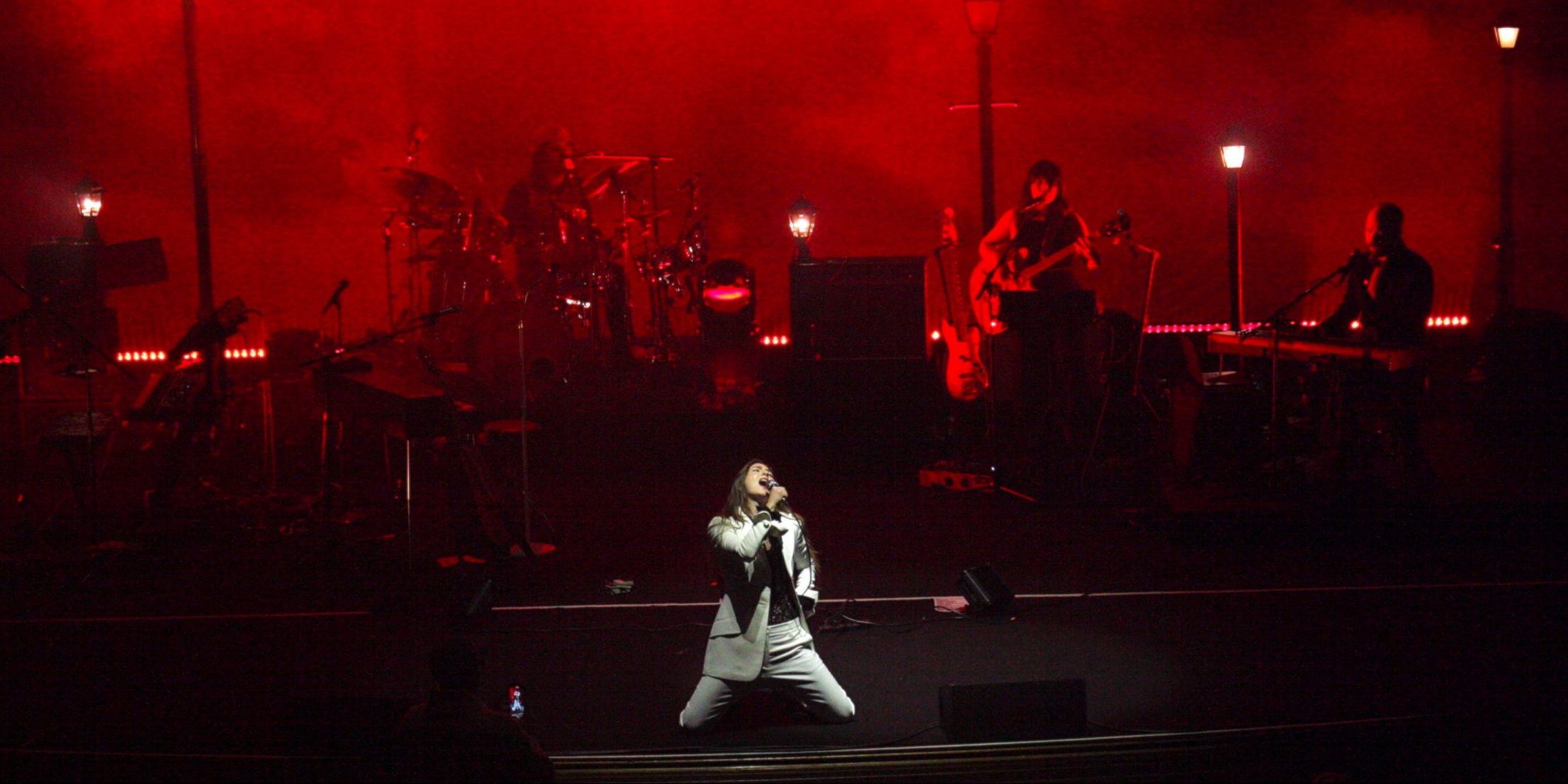Weyes Blood @ The Theatre at Ace Hotel [12/09/22]
Over the past few months, I’ve had to learn my fair share of unpleasant truths about adulthood. A lot of my adult life so far has been spent being devastated by the doldrums of tedious part-time jobs, failed job interviews, and the regular case of FOMO, feelings that I wouldn’t even begin to comprehend if I was younger. Maybe it’s why I haven’t been able to fully grasp the emotional weight of Weyes Blood’s music until, weirdly enough, tonight’s show.
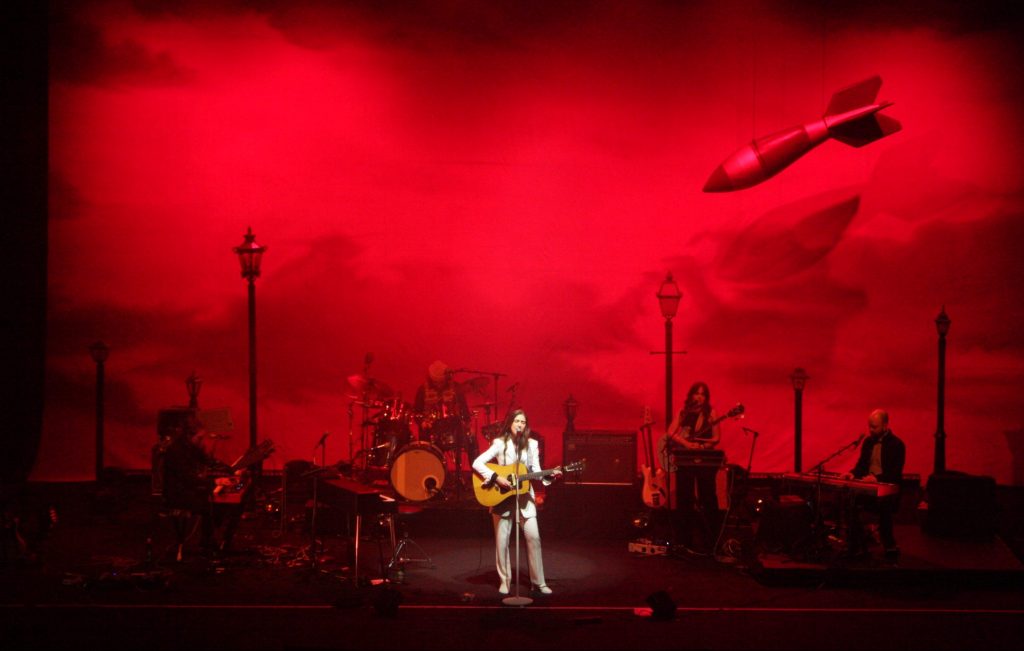
Approaching The Theatre at Ace Hotel, I was taken aback by the lavish neo-Gothic architecture that wrapped around the theater. Every mirror and window, every stud and cusp that lined the building’s pillars seemed to be glossed in a golden sheen. It’s no wonder Weyes Blood had filmed the music video for “It’s Not Just Me, It’s Everybody” here, the first single off of her new album And in the Darkness, Hearts Aglow. The music video depicts the tumults of modern-day technology as an irascible, anthropomorphic cellphone berates Weyes Blood and sustains itself by cannibalizing patrons in the crowd. Tonight though, the theater was scattered not with corpses mauled by a tap-dancing cellphone, but instead with a rowdy crowd of twenty-somethings shivering in the December cold and swarming in excitement for the second night of her In Holy Flux tour.
As I was scoping out the interior, I overheard some small talk that one of the security guards made with one of the concertgoers in line. It turns out that this concertgoer is a newly minted security guard himself. He works as a bouncer at a nightclub in Costa Mesa and frequently finds himself receiving generous tips from drunk girls. Despite a few inconveniences, “the job,” he says, “is overall pretty decent!” The senior security guard on the other hand feels that he’s overstayed his welcome by decades. Despite taking shifts at other venues like The Shrine or The Regent, he can’t seem to gain any more upward mobility within his occupation and has since been learning to cope with the tedium. I can’t help but notice a tinge of regret streaked across his face.
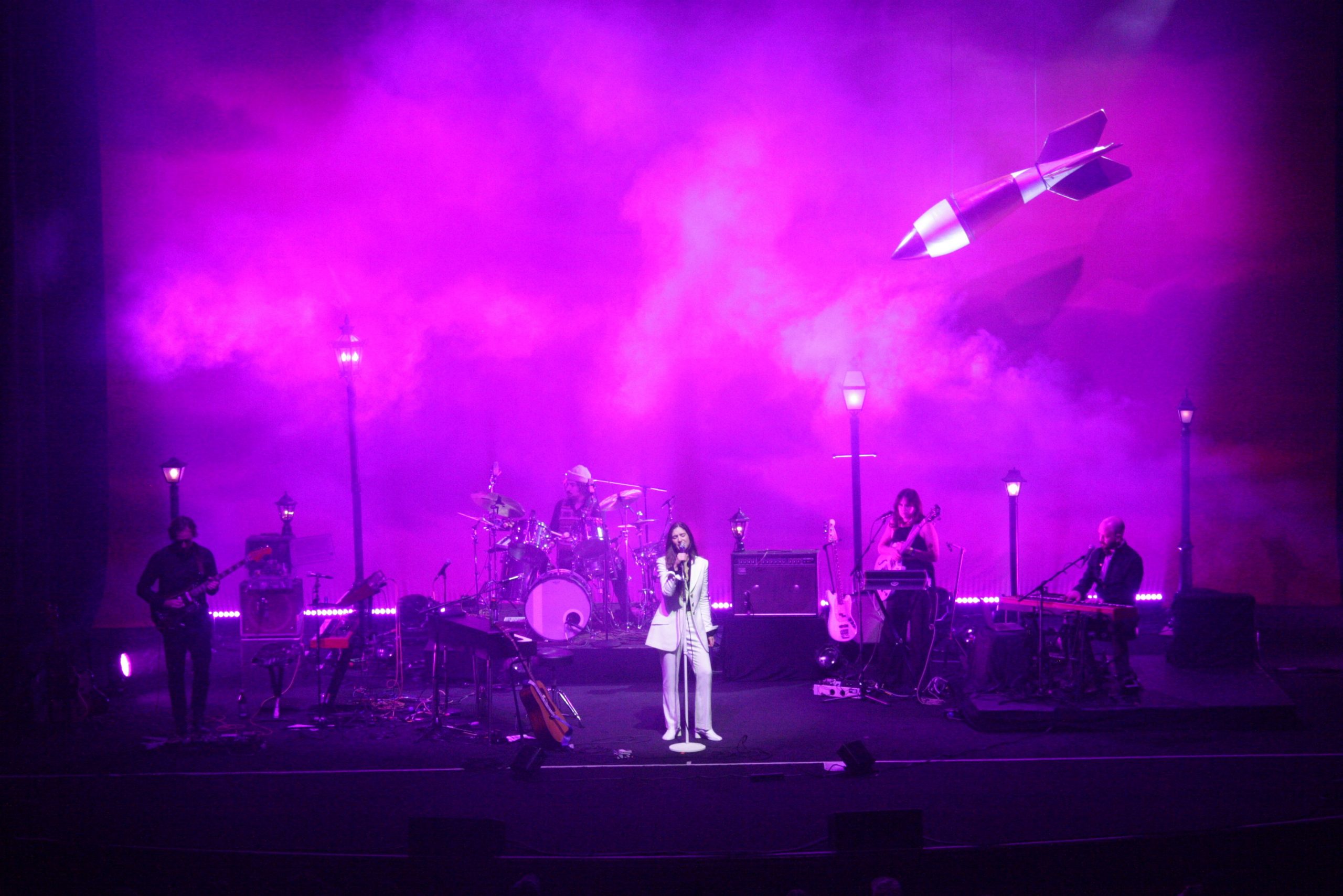
As the crowd shuffled into their seats and caressed their newly purchased vinyl records in their arms, the opening act trotted onto the stage. Tonight’s opener is Storefront Church, an LA native singer-songwriter spearheaded by Lukas Frank who has collaborated alongside the likes of Phoebe Bridgers and DIIV. Tonight though, it’s just Frank and his guitarist. What Frank may lack in manpower he instead makes up for with theatrics and drama, all of it fittingly regal, none of it ever modest. His thunderous keys, reverb-heavy guitars, and deeply cavernous voice carry the grandeur and maximalism of an eclectic chamber pop classic, and it’s clear that even with such a minimal setup, the audience couldn’t have been more enthralled by his performance.
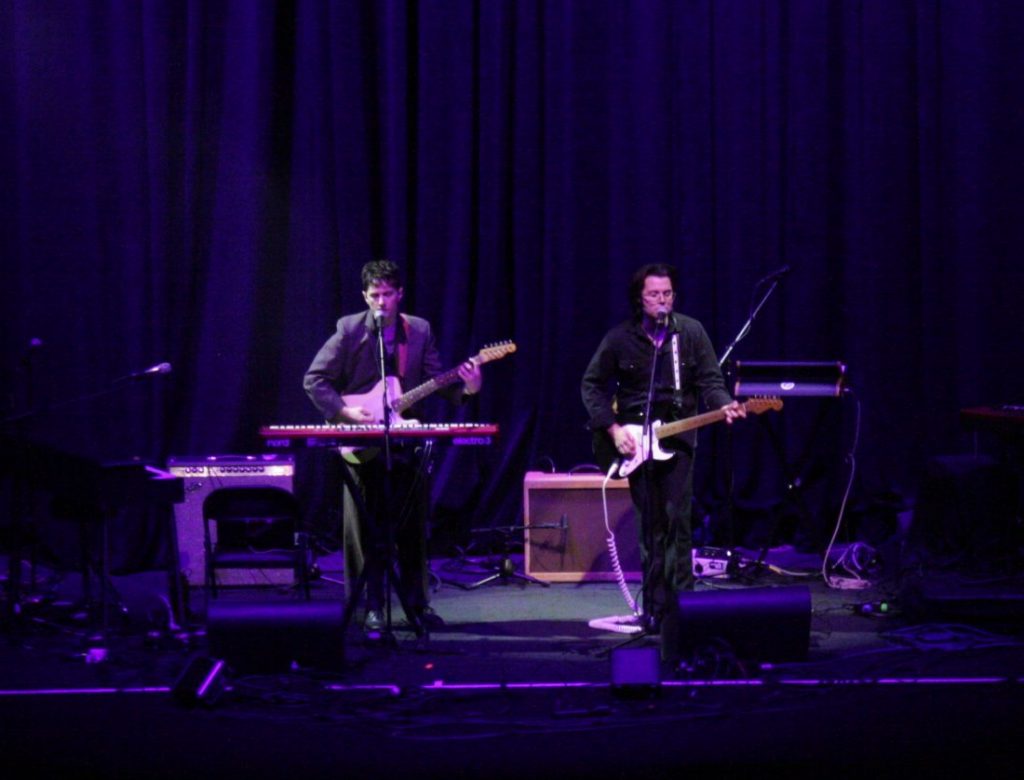
Most of his setlist comes from his 2021 record As We Pass, a record whose haunting instrumentals are paired with the levity and wry humor of his lyricism. He sings of kitchen sinks in the trunk of a Mazda and the passing cars that have turned him into roadkill. He also includes a cover of Low’s “Words” in his setlist, a personal favorite of mine. Finally, he closes off his set with an unreleased track, one that starts mellow but builds into pure cacophony by the end, leaving the audience in suspended animation for a long while.
All the tension in the audience is later relieved when the red curtains sitting behind Storefront Church are finally drawn, only to reveal that the exact stage from the “It’s Not Just Me, It’s Everybody” music video had been recreated for tonight’s show. A bloodshot sky faces the crowd and a caricatural nuclear bomb floats ominously above the instruments, subtly warning us that while nothing is necessarily happening right now, something might soon. Moments later, Weyes Blood finally sets foot on stage.
She begins her set with singles from Hearts Aglow, starting with the very song that tonight’s stage was decorated for and following it up with “Children of the Empire” and “Grapevine.” Occasionally, she dives back into her Titanic Rising days, sneaking in tracks like “Something to Believe” and “Everyday” in between her newer singles. Unlike during Storefront Church’s rather downcast presentation of indie singer-songwriter music, everyone starts squirming in their seats to the jaunty baroque pop of Weyes Blood. Even Weyes Blood herself starts tap dancing during instrumental sections of each track, vicariously living out our collective urge to dance along with her.
Her introduction is brief. “Welcome to my living room,” she tells the audience. “It’s just imminent nuclear destruction, no big deal.” As she fiddles with her in-ears, Weyes Blood tells us that she plans on making tonight’s show interactive. At one point, she confesses she wanted to request the audience to stand up and “soft bash” during her performance of “God Turn Me Into a Flower” but figured it “felt too much like church.” The audience is quick to rebut her, as one audience member in the crowd shouts to her to “OPEN THE PIT”. While a mosh pit never forms in the end, we are instead gifted with more of Weyes Blood’s angelic performances.
Later in the set, she holds an impromptu Q&A session. Unsurprisingly, the audience begins to bombard her with questions. What is your favorite color? Favorite movie? Are you in love? And of course, the occasional heckler reprimanding everyone for asking bad questions. Finally, Weyes Blood picks a question she likes. “What is your pet peeve?”, the audience member asks. She ponders for a moment but ultimately answers, “My generation. No one talks on the phone anymore. Everything can be solved with a simple phone call.”
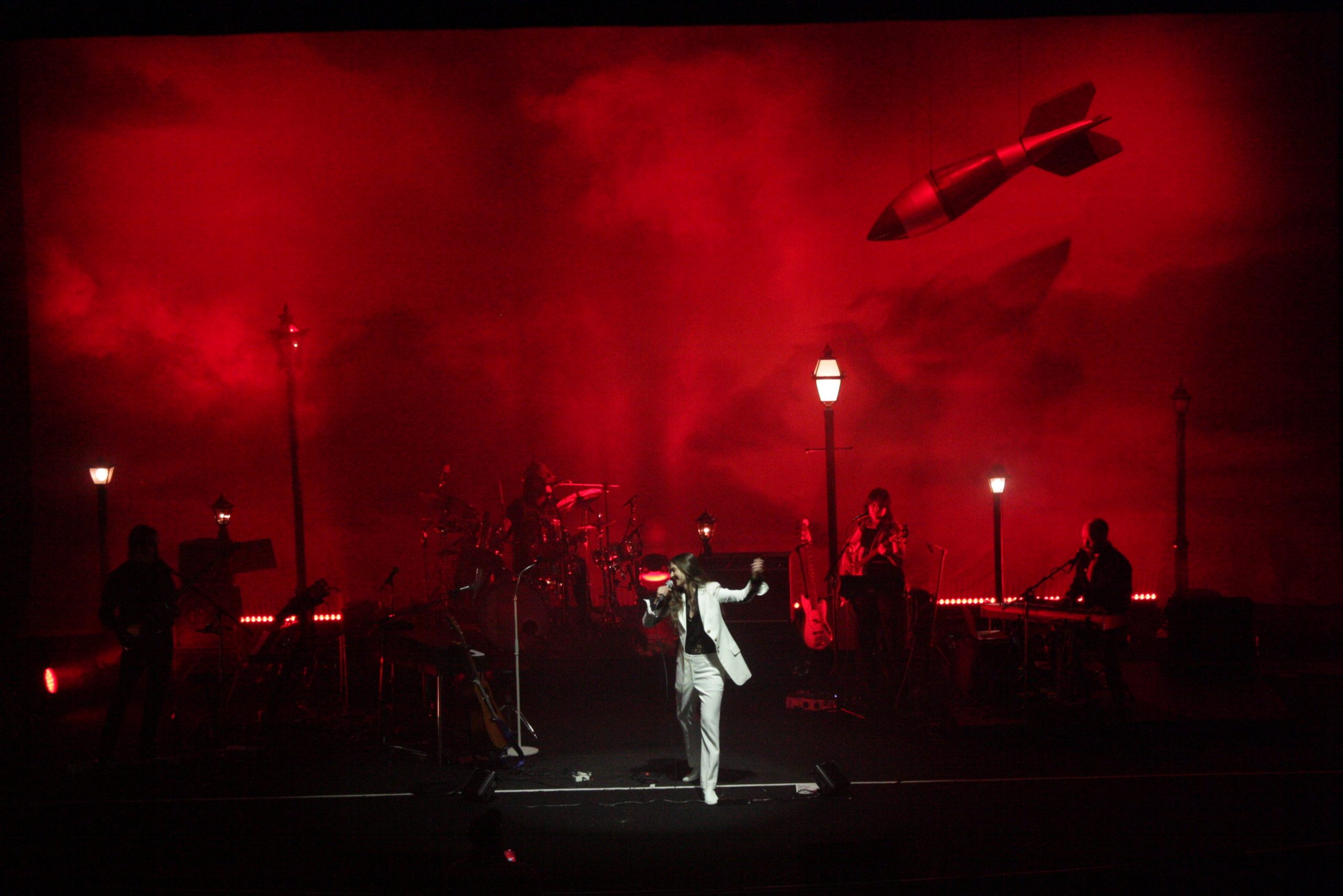
As the final leg of her set comes fast approaching, it’s clear the crowd is starting to grow sentimental. It’s during “Andromeda” when I notice small enclaves in the audience swaying back and forth, arms wrapped around each other’s shoulders. More of the audience grow frenzied during “Hearts Aglow”, and similarly Weyes Blood herself becomes the most animated she’s ever been the entire night. As she sings about looking for love in all the wrong places, she unbuttons her white blazer, uncuffs her sleeves, and swaggers along the stage, almost as a sort of resignation to the post-apocalyptic dystopia she’s found herself in. Soon enough, the entire theater finds itself collectively undulating with each of Weyes Blood’s moves.
A comment she had made earlier in the night comes to mind: “It’s all about catharsis. That’s why we’re all here. That’s why I’m here.”
If I was still fresh into my teenage years, I don’t think I would have understood her comment. Now that I’ve grown older, I’m starting to see what she’s talking about.
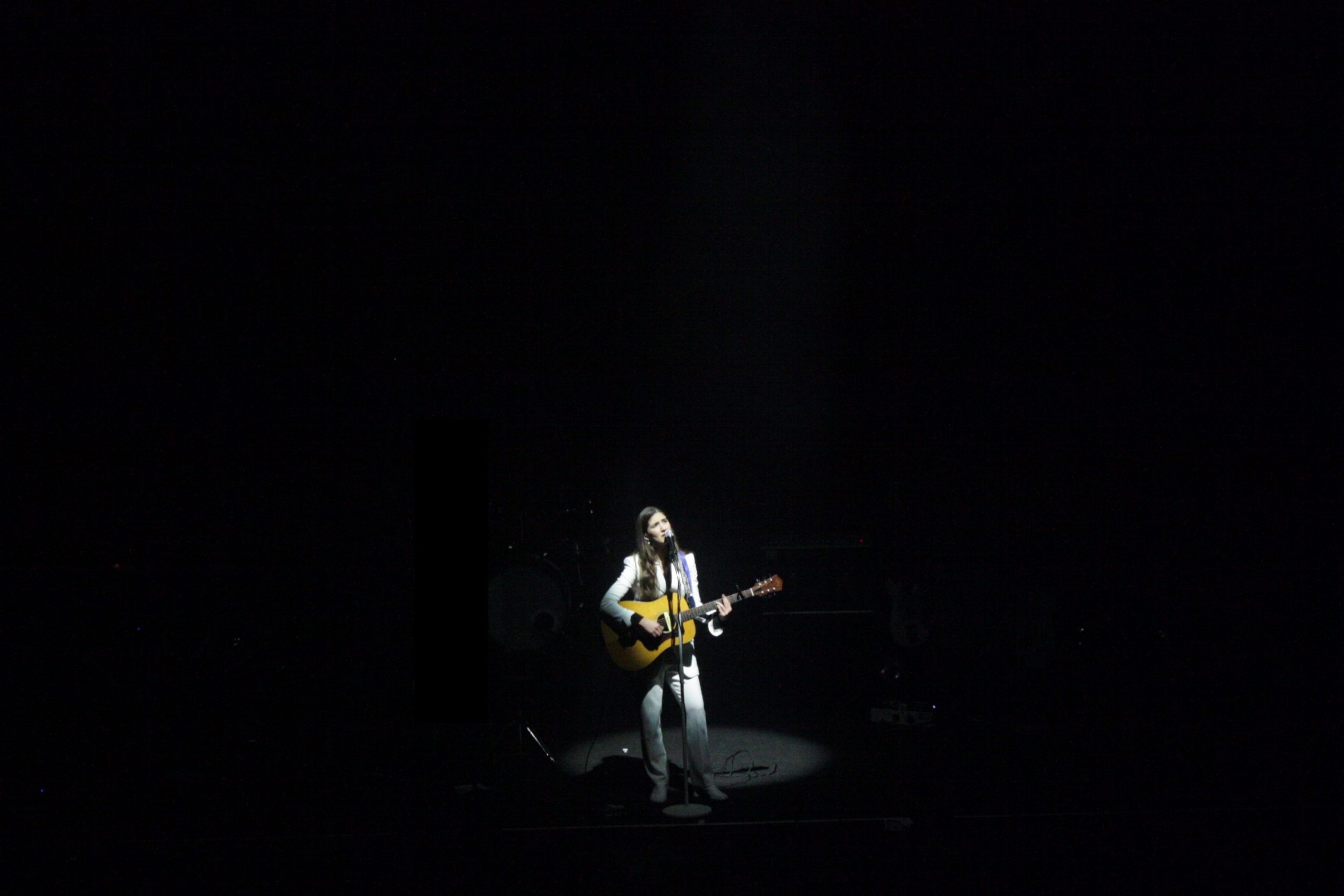
Of all the brutal truths I’ve had to learn about adulthood, perhaps the one that I found the hardest to digest was realizing just how difficult it is to make friends as an adult. Personally, I’ve never been great at starting or keeping conversations going, and it doesn’t help that my social anxiety makes it harder for me to rebound from failed interactions. As a result, I’ve been busier trying to keep myself sane more than anything else, and opportunities to seek human connection all seem to dissolve into fleeting non-interactions. I still find myself waiting in vague hope that someone would remedy the loneliness, but to no avail.
And so we find ourselves here in this theater, the cathartic cries of Weyes Blood and the audience all coming to head on a Friday night in downtown LA. In our sorrow over a miserable security guard job, lack of communication by phone, or, in my case, the growing concern that I might remain eternally friendless, we try to sift through the remnants of a life that once was and see where it all went wrong. In her official album announcement, she writes, “…we are literally in the thick of it. Feeling around in the dark for meaning in a time of instability and irrevocable change. Looking for embers where fire used to be. Seeking freedom from algorithms and a destiny of repetitive loops. Information is abundant, and yet so abstract in its use and ability to provoke tangible actions. Our mediums of communication are fraught with caveats. Our pain, an ironic joke born from a gridlocked panopticon of our own making, swirling on into infinity.”
Tonight, the gentle pleas of Hearts Aglow and Titanic Rising call humanity to action. We’ve outgrown an era where the most trivial of things like astrology, movie romances, and scrawlings on bathroom walls can provide convenient answers to our collective misery. Inevitably, a lot’s gonna change in our lives, and encountering inconvenient truths about ourselves is always going to be part of the deal. Because of it, we might grow averse to the people and places that have left us in this state of deep hurt in the first place, leaving us to hyper isolate from each other. But if we look close enough and find that, in the end, we all bleed the same color, perhaps we can find that we might not be so alone after all.
With this in mind, Weyes Blood concludes her set with “A Lot’s Gonna Change” and “Picture Me Better,” songs that gently remind us that amid the impending doom, we can still find solace in each other. That when the lonesomeness starts to become a friendly presence, we are not its only friend. That sometimes, it’s okay to cry it all out.

